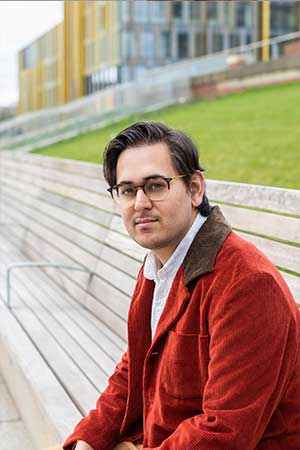PhD Philosophy student Kash Sunghuttee says the University of Birmingham provides students with the “trust and freedom to discover their own voice”. We find out more about his experience as a researcher at the University.
 Why did you choose to study a PhD in Philosophy?
Why did you choose to study a PhD in Philosophy?
“I enjoyed Philosophy so much at undergraduate level that I knew I wanted to carry on doing it. When I was thinking about putting together a research proposal, I noticed a gap in the research in which I might have something original to say. The opportunity to spend three years doing nothing but Philosophy was too good to pass up.”
Why did you choose to undertake research at the University of Birmingham?
“The department here is big, and has people doing great research across lots of different specialties. My project is interdisciplinary, and so studying here at the University of Birmingham allowed me to be supervised by leading experts in two different areas of philosophy.”
What are the best things about your course?
“I get great support from my supervisors. They are very generous with their time, and have provided extraordinarily helpful advice on how to shape my project and develop as a researcher. The postgraduate community at our department is friendly and constructive. The postgraduate seminar here is a wonderful place to receive feedback on your work.”
What is life like as a researcher at the University of Birmingham?
“Academically, you are given the trust and freedom to discover your own voice. From the first day of the PhD you are treated as a proper researcher. This gives you the confidence to explore your ideas and do more interesting research. Socially, my department is friendly and welcoming. There’s always someone to get coffee with, or have a chat to, or pitch a wild idea to.”
What support have you received during your PhD?
“My supervisors have been very supportive, both in an academic sense and in a pastoral sense. A PhD is three years, which is a long time, and naturally difficulties crop up. My supervisors and the department more generally have always given me the support, trust and time to move past these difficulties in one piece.”
Outside of your research, what experience have you gained and how will it help you in the future?
“There’s lots of teaching available at the Philosophy department. I was teaching in my first term of my PhD. Teaching experience is invaluable and has helped me develop skills that are applicable outside of academia. I have developed my skills in public speaking, presentation skills and making sure an audience is engaged. On top of this, I did a three month internship in the charity sector, and the University were very amenable to making this fit into my PhD without friction.”
Find out more studying for a PhD in Philosophy over on our course pages.